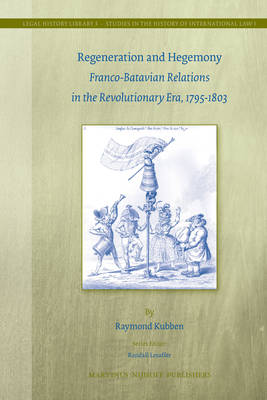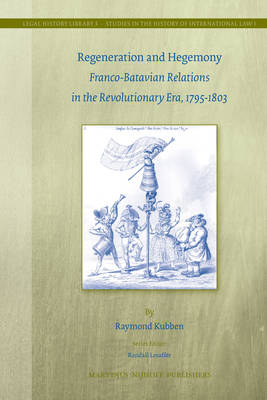
- Afhalen na 1 uur in een winkel met voorraad
- Gratis thuislevering in België vanaf € 30
- Ruim aanbod met 7 miljoen producten
- Afhalen na 1 uur in een winkel met voorraad
- Gratis thuislevering in België vanaf € 30
- Ruim aanbod met 7 miljoen producten
Zoeken
Regeneration and Hegemony
Franco-Batavian Relations in the Revolutionary Era, 1795-1803
Raymond Kubben
€ 343,45
+ 686 punten
Omschrijving
What is the relevance of law to a world dominated by a hegemon? What is the relation between power and law at the international level? In this volume, these questions are approached based on a case study of relations between France and the Netherlands throughout the Revolutionary Wars. It shows that power and law are not isolated phenomena and that their relation is not as one-dimensional as it is commonly portrayed. Law can be an instrument of power, while law poses a normative force even a superpower cannot ignore. Thereto, the case study sketches a context in which an international law based on sovereign equality could, to a large extent, be circumvented by exploiting crossborder factionalism, thus nuancing state-centric perspectives on international politics.
Studies in the History of International Law, vol. 1
Studies in the History of International Law, vol. 1
Specificaties
Betrokkenen
- Auteur(s):
- Uitgeverij:
Inhoud
- Aantal bladzijden:
- 808
- Taal:
- Engels
- Reeks:
- Reeksnummer:
- nr. 3
Eigenschappen
- Productcode (EAN):
- 9789004185586
- Verschijningsdatum:
- 17/01/2011
- Uitvoering:
- Hardcover
- Formaat:
- Genaaid
- Afmetingen:
- 155 mm x 235 mm
- Gewicht:
- 1463 g

Alleen bij Standaard Boekhandel
+ 686 punten op je klantenkaart van Standaard Boekhandel
Beoordelingen
We publiceren alleen reviews die voldoen aan de voorwaarden voor reviews. Bekijk onze voorwaarden voor reviews.








